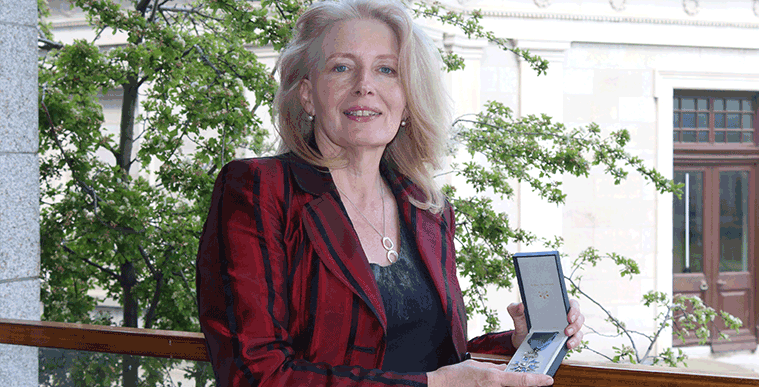Sarah Alyn-Stacey, a Trinity Fellow and current member of the College Board, has announced her intention to apply for candidacy for the provost election. Dr Alyn-Stacey, who is also an Associate Professor in the Department of French, had previously indicated to Trinity News in late November that she did not plan to enter the race. In her capacity as a member of the Board, Dr Alyn-Stacey would have sat on the committee which interviews applicants for the role and said that she “must remain neutral about any prospective candidates”.
However, Alyn-Stacey has now confirmed to Trinity News that she had put her name forward late last week, just before the close of applications on Friday afternoon. She will now be obliged to step down from the interview committee. In an email statement sent before the declaration of her candidacy, she laid out the themes she believed would be important in the upcoming election.
She identified Trinity’s place in world university rankings as “a key issue”. She said it was “not acceptable” for the college to be ranked 155th in the world, “as a university established as the equal of Oxford (1) and Cambridge (6).” In order to raise Trinity’s academic profile, Alyn-Stacey said that the reduction of the staff-student ratio was essential; specifically she would like to see it go from 20-1 to 12-1, “even if this means a reduction in student numbers”. She also called for the “recruitment of outstanding academics” and an increase in administrative supports for all teaching staff, saying that an increase in administrative responsibilities on academic staff had lowered morale in recent years.
The statement went on to harshly criticise Trinity’s reliance on “underpaid Teaching Assistants”, saying that “what should have been an exciting employment prospect for these early-career researchers has often developed into a quite miserable and disillusioning experience.” Alyn-Stacey said that the work currently being done by TAs should be transferred to newly recruited, permanently employed academics.
College also needs “an ongoing commitment to the promotion of gender equality”, according to Alyn-Stacey, citing Trinity’s founding by Elizabeth I and its failure to have a single female provost in its four centuries of existence. She also believes that “the next Provost needs to ensure a sensitive and rational engagement” with topics like ”racism, harassment and inequality”, but is concerned about “radical politicisation of the curriculum” and accusations of sacrificing too much to “political correctness”.
Alyn-Stacey also expressed views on several issues surrounding Trinity’s administration and governance. In reference to the Trinity Education Project, she is concerned about the “danger” of “dogmatic attachment to the concept of a fixed timetable” diminishing the array of “intellectual offerings” available to students. She wants to see “academic judgement, not over-simplistic administrative machinery” at the centre of decisions about the university’s curriculum and overall direction.
She also declared her opposition to government proposals for a reform of Trinity’s Board, saying that “to reduce the size and diverse membership” of the body would constitute “an error of judgement”. While she thinks additional external advice in College’s governance “should certainly be considered”, that Trinity “must maintain our distinct identity and independent spirit”. She also is against any reduction in the role played by Fellows and Scholars in Trinity’s organisational structure.
Alyn-Stacey also believes that in the interests of “collegiality”, students and academic staff “should be encouraged to live in College” and “dine on Commons” as much as possible. She wants to “reinforce the College’s scholarly identity” among the Trinity community. Additionally, with reference to both Irish and overseas students, she cited the importance of adequate services, so that no one is “disappointed in their educational experience,” and connected this to “the need to ensure optimal conditions in which academics teach and administrators administer.”
The statement concluded with reference to Trinity’s history, saying that the university’s “place in Irish society should first and foremost be at the heart of the campaign.” Alyn-Stacey said that the college “still stands as an unequalled example in the whole of Ireland of a non-sectarian institution” and a place of “harmonious religious and cultural integration,” and that this should be a source of pride. The new provost should, according to her, “hold this past dear”.
Professors Linda Doyle, Linda Hogan, and Jane Ohlmeyer have also announced that they applied for candidacy.
Following the interview committee’s selection of candidates, the campaign period for the provost election will run from 5 February to 7 April. The election itself is scheduled for Saturday, 10 April 2021. All full-time academic staff who have been employed for at least one year, as well as a small number of student representatives, are eligible to vote.
The successful candidate will take up office on 1 August, pending approval by the College Board.






